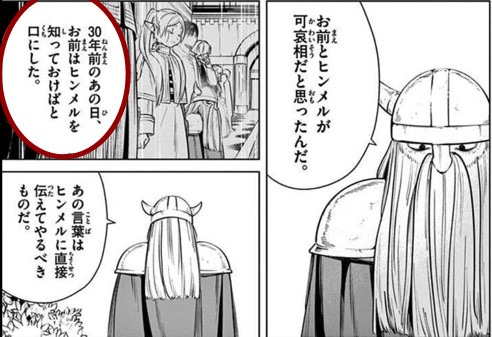Hello everyone,
First post here! I’m a regular user of Bunpro for already almost a year, and it helped me improve my level a lot, so some weeks ago I started trying to read manga and books to try to immerse myself even more. From time to time though, I encounter grammatical constructions that are probably simplified in spoken language, and confuse me a lot. Here’s one example I recently met in 葬送のフリーレン

Here the sentence that poses me a problem is in the bubble in red (I put the previous and next scene for context, if more context is needed please tell me):
30年前のある日、お前はヒンメルを知っておけばと口にした
In particular, I’m pretty lost about the part in bold. There’s the verb 知る (to know) + the ておく form, i.e. something like “to know in advance”, or in better English “to get to know” I guess, and finally the ば form, i.e. “If I got to know Himmel…” (given that ば expresses provisional, that should be it, but given that I’m still a bit confused about the different modes, please correct me also here if something better could be said). Now this ば is directly followed by the quotation と, it looks like something is missing here. It looks like to me that it should be よかった, because then from the ばよかった lesson it could match the regret expression: “If only I got to know Himmel (more)…”, so then the total sentence would be:
"On this day a few years ago, you said ‘If only I got to know Himmel more…’ "
Is this my correct understand that the よかった could be omitted in casual speech, or there something else going on here?
Thank you in advance for any advice or explanation!



 you really did put the title there. My brain did not put the two and two together. That is kinda awkward.
you really did put the title there. My brain did not put the two and two together. That is kinda awkward.